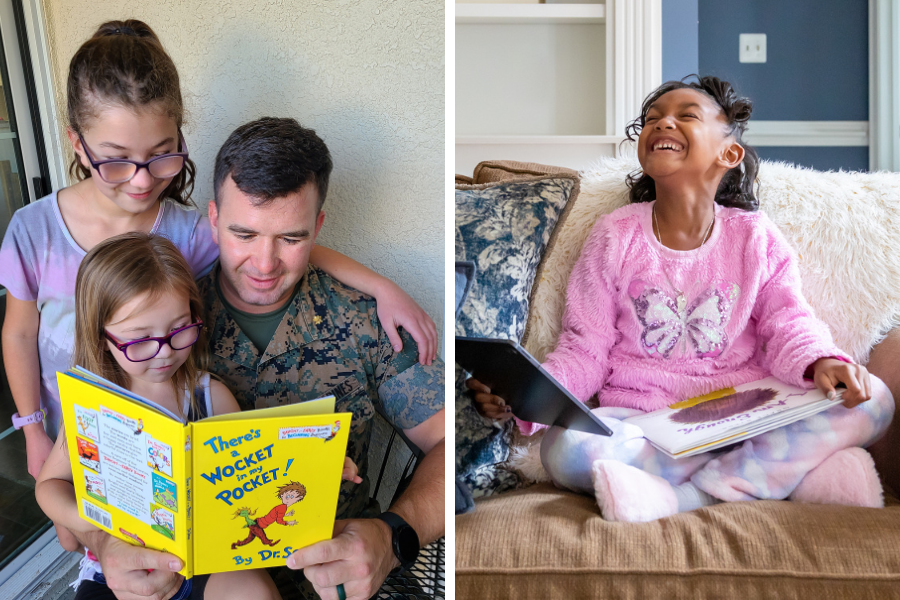
The Five Big Ideas of Literacy and How You Can Best Help Your Emerging Reader
February 16, 2023
Parents are generally interested in helping their children be the best version of themselves; they take great pains to provide opportunities for success. This often comes in the form of putting kids into sports leagues and music lessons from an early age; paying in time and dollars for expensive camps, courses, or coaches. Parents aim to provide their children with access to the right schools, the latest technology gadgets, and quality organic meals. Depending on your family values and your budget, the quantity and quality of your efforts may vary.
However, there is an often overlooked, but very accessible way to set a child on the path to lifelong success: helping your child learn to read. Being a fluent reader is a predictor of future success by a variety of measures. Readers are known to have academic advantages, sustain lifelong enjoyment of books, and have highly attuned skills of communication, memory, empathy, improved mental health, reduced stress, and a longer lifespan– to name a few.
In as little as a few minutes each day parents can have an enduring, indelible impact on their child’s future trajectory in life. Time together with the shared experience of a good book is a start, but to make the most of your storytime, consider these five big ideas of literacy to best help your emerging reader.
Phonics
In its most basic form, phonics involves helping your child make connections between spoken words and individual sounds (phonemes). For phonics, think sounds and oral language. As you go about your day, make word play fun. Help your child hear words that rhyme (bat-cat-sat; tree-bee-see), read books that rhyme (Dr. Seuss and Llama Llama books are just two ideas), and recite or sing songs or nursery rhymes.
Alphabet
As your child begins to develop oral language skills, the next connection they will make is that letters are symbols that each have a specific sound. While practicing the alphabet and saying the letters together is a good start, children need to connect the sounds letters make to the printed, written letter. In this stage of literacy one of the easiest ways parents can assist is to let their children play with letters. Have a set of alphabet stamps for letter play, help kids shape letters with their fingers using Playdoh, clay, or bendable pipe cleaners. Read A-B-C books, have them paint with water, write in shaving cream, or use sticks or blocks to manipulate letter construction. With continued recognition of letter sounds and letter shapes, a child begins to understand the alphabet better.
Fluency
Reading fluency is simply the ability to read easily, measured by accuracy, speed, expression, and comprehension. If children have a strong phonics and alphabetic foundation, strong fluency is sure to follow. Great ways parents can help to strengthen fluency skills are to model fluent reading themselves, re-reading familiar books, and providing audio book recordings where children hear good books read well. The United Through Reading App is a great way to help build fluency by offering children an opportunity to hear their favorite story, read by someone they love, on repeat. With a personal copy of the book in hand along with the recording, your children will make the important connections between oral language and the written word.
Vocabulary
According to Reading Rockets, another valuable way parents can engage with their children’s vocabulary development is by, “Talking to and reading with your child … to help them hear and read new words. Conversations and questions about interesting words are easy, non-threatening ways to get new words into everyday talk.” Other ways to build a child’s vocabulary at home include telling stories, pointing out everyday observations and their associated terms, words, or phrases, and using big words instead of oversimplifying. Just be sure to put new words into context and give basic definitions based on age and understanding.
Comprehension
The final stage of literacy development and the last of the “Big 5” ideas is comprehension. As each phase from phonics, alphabet, fluency, to vocabulary builds, each stage is moving your reader closer to being able to fully comprehend what they read. Help to build your child’s comprehension by having them read aloud to you, asking good questions about the story, and making connections to what they are reading. United Through Reading’s book list helps to take the guesswork out of choosing the right stories based on topics of interest and age appropriateness.
This year, as you and your family resolve to read, do so with heart, intention, and purpose. The time and energy you invest in those small moments connecting over stories will continue to yield positive educational and relational effects for years to come.
